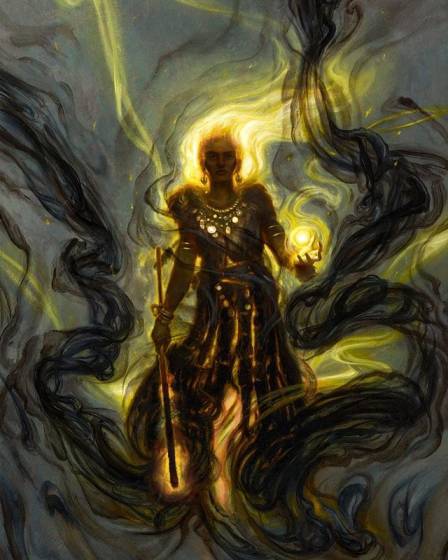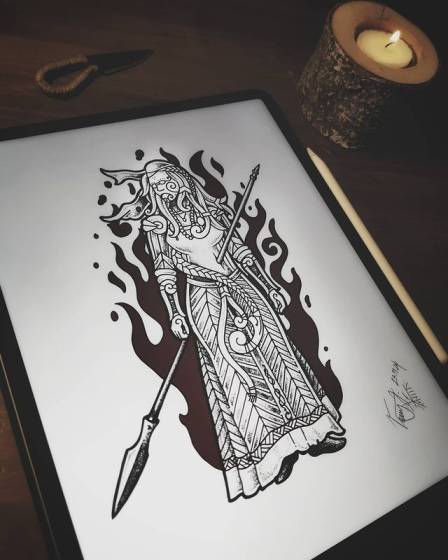Gullveig is the goddess of magic and gold. Thrice burnt and thrice reborn she is considered the main reason for the Aesir – Vanir war.
Gullveig responsibilities
Properties of gold, seidr magic and witchcraft
Gullveig weapon/domain of power
Healing, impervious to steel and fire, magic, seidr – the ability to see into the future and alter it, rebirth, sorcery and witchcraft
Thrice burnt and thrice reborn
Gullveig is a Vanir goddess associated with seidr magic and the precious metal of gold. Her name means gold strength or gold power, and although she is mentioned only once in the Poetic Edda, she is a powerful deity.

For reasons unknown, one-day Gullveig visited Asgard and spoke to the Aesir inside Odin’s hall about her obsession with gold. She also showed them her seidr magic and how she could affect the timeline.
The gods were intimidated by her strength and it is not sure whether out of fear or from their aversion towards her insanity about gold, they quickly decided to kill her. They took up their spears and pierced her body, but Gullveig couldn’t die by their blades so the Aesir threw her into the fire. The Vanir goddess however emerged unscathed from the flames and the gods of Asgard threw her two more times in the hearth. Still, she came out untouched by the fire (thrice burnt and thrice reborn) and that is when she took up the name Heidr, meaning ‘the gleaming one’ in Old Norse.
War and Peace
There is no doubt that Gullveig’s maltreatment was the cause of the Aesir – Vanir war. It was the first conflict in the world. However, as Gullveig is connected with another Vanir goddess, Freyja, there is a strong possibility that her twin brother, Freyr was the one who gathered the Vanir horde and declared war against the Aesir.
Some scholars argue that Gullveig’s lust for gold and the corruption instigated among the Aesir was what really led the gods to burn her alive and that her torture enraged the Vanir, who decided to attack the perpetrators.
Whatever the case may be, the divine battles lasted many years until in the end, peace was established and hostages were exchanged between the Aesir and Vanir.
Mentions

Gullveig is mentioned only once in the old texts. In the Poetic Edda, in the poem Voluspa, a seeress remembers the first great war in the world when the Aesir gods stabbed Gullveig with spears and burned her in Odin’s hall. Three times they burned her and three times she was reborn. Heidr they called her then, a mantic witch, skilled in magic, who performed seidr in a trance wherever she could. She (Gullveig/Heidr) was always a joy to wicked women.
Play Fun Norse Quiz
Is this article making you even more curious about Norse gods and goddesses? You can satisfy your curiosity by playing a fun Norse mythology quiz. This way, you can test your knowledge about Norse gods and goddesses, as well as fill in some gaps. Good luck and have fun playing!
Don’t forget to try our other games as well!
Frequently Asked Questions
Q. Why was the Aesir so hostile to Gullveig?
A. The Aesir are a proud race of gods. Odin is their king and Odin doesn’t forgive intruders. Gullveig was an uninvited guest to their halls and when she started speaking about gold, the Aesir had this fever of greed. Odin saw that and couldn’t allow a stranger to bring chaos and disorder in his realm. Indeed, especially a dangerous one who could practice seidr. Therefore, he ordered the attack on her.
Q. Was Gullveig an evil goddess?
A. Gullveig wasn’t evil; she was just a misunderstood deity. She loved gold too much, but that was her only flaw. Beyond that, she didn’t harm anyone and when the Aesir speared and burned her she didn’t even lift a finger to protect herself. That can only mean she knew her destiny and thus allowed it to happen. Even when she became Heidr and assisted mortal witches in their sinister quests she couldn’t be called evil. She simply answered those women’s pleas and merely came to them.
